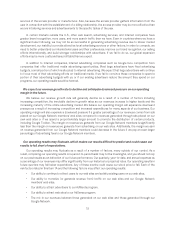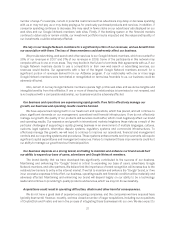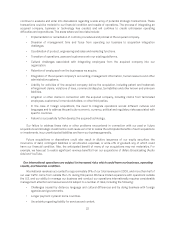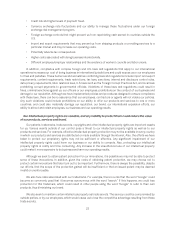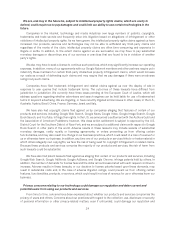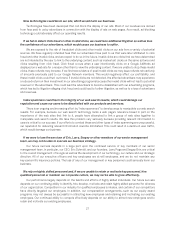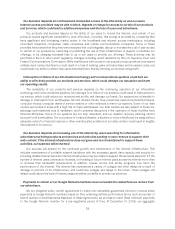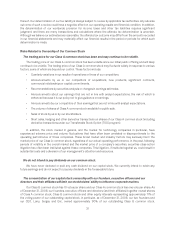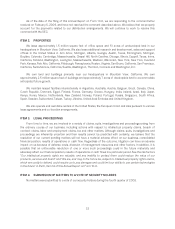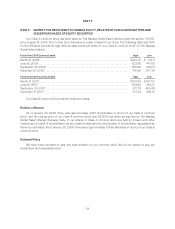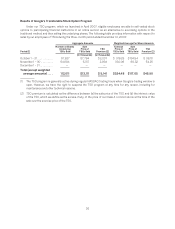Google 2008 Annual Report Download - page 42
Download and view the complete annual report
Please find page 42 of the 2008 Google annual report below. You can navigate through the pages in the report by either clicking on the pages listed below, or by using the keyword search tool below to find specific information within the annual report.More individuals are using non-PC devices to access the internet. If users of these devices do not
widely adopt versions of our web search technology, products or operating systems developed for these
devices, our business could be adversely affected.
The number of people who access the internet through devices other than personal computers, including
mobile telephones, personal digital assistants (PDAs), smart phones and handheld computers and video game
consoles, as well as television set-top devices, has increased dramatically in the past few years. The lower
resolution, functionality and memory associated with alternative devices make the use of our products and
services through such devices more difficult and the versions of our products and services developed for these
devices may not be compelling to users, manufacturers or distributors of alternative devices. Each manufacturer
or distributor may establish unique technical standards for its devices, and our products and services may not work
or be viewable on these devices as a result. As we have limited experience to date in operating versions of our
products and services developed or optimized for users of alternative devices, and as new devices and new
platforms are continually being released, it is difficult to predict the problems we may encounter in developing
versions of our products and services for use on these alternative devices and we may need to devote significant
resources to the creation, support and maintenance of such devices. If we are unable to attract and retain a
substantial number of alternative device manufacturers, distributors and users to our products and services or if
we are slow to develop products and technologies that are more compatible with non-PC communications
devices, we will fail to capture a significant share of an increasingly important portion of the market for online
services, which could adversely affect our business.
Our business may be adversely affected by malicious applications that interfere with, or exploit
security flaws in, our products and services.
Our business may be adversely affected by malicious applications that make changes to our users’
computers and interfere with the Google experience. These applications have in the past attempted, and may in
the future attempt, to change our users’ internet experience, including hijacking queries to Google.com, altering or
replacing Google search results, or otherwise interfering with our ability to connect with our users. The interference
often occurs without disclosure to or consent from users, resulting in a negative experience that users may
associate with Google. These applications may be difficult or impossible to uninstall or disable, may reinstall
themselves and may circumvent other applications’ efforts to block or remove them. In addition, we offer a number
of products and services that our users download to their computers or that they rely on to store information and
transmit information to others over the internet. These products and services are subject to attack by viruses,
worms and other malicious software programs, which could jeopardize the security of information stored in a
user’s computer or in our computer systems and networks. The ability to reach users and provide them with a
superior experience is critical to our success. If our efforts to combat these malicious applications are
unsuccessful, or if our products and services have actual or perceived vulnerabilities, our reputation may be
harmed and our user traffic could decline, which would damage our business.
Proprietary document formats may limit the effectiveness of our search technology by preventing our
technology from accessing the content of documents in such formats, which could limit the
effectiveness of our products and services.
A large amount of information on the internet is provided in proprietary document formats such as Microsoft
Word. The providers of the software application used to create these documents could engineer the document
format to prevent or interfere with our ability to access the document contents with our search technology. This
would mean that the document contents would not be included in our search results even if the contents were
directly relevant to a search. The software providers may also seek to require us to pay them royalties in exchange
for giving us the ability to search documents in their format. If the software provider also competes with us in the
search business, they may give their search technology a preferential ability to search documents in their
proprietary format. Any of these results could harm our brand and our operating results.
26





